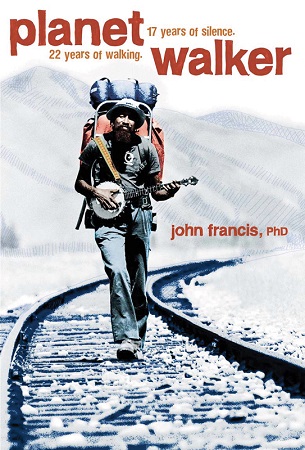
John Francis has literally walked thousands of miles, but the 69-year-old environmentalist — in Beijing this weekend for an event with The Hutong Sunday — insists that he has more ground to cover.
Despite having traversed South America and the entire U.S. during previous environmentally-themed treks, Francis was still enthralled by a seemingly simple little stroll through a Hangzhou orchard last year, which motivated him to make China his next destination.
On that Hangzhou trip, he and the student group he was mentoring passed by those innumerable dangling oranges, they were approached by the orchard’s clipper-wielding owner. Within minutes, Francis and his fellow travellers were snipping away at the branches and scooping up handfuls of fruit, as the local man looked on with a beaming smile.
“Some of those students loved gathering oranges on that trip, others were amazed by locals that taught them how to pick tea,” Francis—a towering African-American with grey dreadlocks, a gentle voice and a warm grin—says of the first “walking campus” he embarked upon during his last visit to China in the fall of 2014.
Those excursions were designed to help students connect with nature and people of other backgrounds, in order to gain a hands on appreciation of the environment (along with some extra academic credit).
Francis has returned to China again this week, and on Sunday he has a full slate of activies in conjunction with The Hutong, including a Forbidden City vist, a drop-in musical jam session, and a lecture on his work.
Francis traces his concern for the environment to 1971, when an 800,000 gallon oil spill coated the San Francisco Bay Area and left thousands of birds and other creatures covered in toxic goo. The then 24-year-old Francis volunteered with other local residents in the cleanup effort, but that work felt alarming insufficient for the would-be activist.
“After seeing the oil spill, I thought giving up riding in cars was the only thing I could do in order to make a difference,” Francis said.
Friends dismissed his plan, but Francis stayed with it, giving up automotive transportation entirely and embarking on a massive journey by foot — and also taking a vow of silence throughout the journey.
“When I told people about my plans to walk, they kind of looked at me like: ‘John, one person doing such a small thing won’t make a difference.’ So I stopped speaking, and that changed my life because I learned to listen to other people, and I learned I hadn’t been. Listening helps us learn from the wisdom in all of us. And through the process of learning to listen to each other, we get to really learn.”
Francis’ silent stroll eventually became a cross-country odyssey. He kept walking — and not talking — adding with a wry grin that this was “long before Forrest Gump,” making it all the more unprecedented. Along the way he helped people build houses, learned how to carve boats from trees, jammed with travelling musicians, and more. He would mime his intentions to people (or write a note when absolutely necessary).
Word spread of his peculiar trip, and before long it was being covered in newspapers and magazines. And it continued for the next two decades.
Eventually National Geographic published his memoir about the experience: Planetwalker: 22 Years of Walking; 17 Years of Silence. Universities in Wisconsin, Montana and and Oregon gave him credit for his efforts that led to him earning a Ph.D in land resources.
Through his academics he began speaking again, met and collaborated with other famed environmentalists like Jane Goodall, and was recruited by both the United States Coast Guard and the United Nations— helping to pen legislation about oil spill cleanups for the former, and working as an Environmental Program Goodwill Ambassador for the latter. He also took a second walk across South America, and gave an acclaimed TED Talk about his work (click here, VPN required).
By March of 2014, Francis had attained such renown that teachers were incorporating him in their curriculum. One such educator was Daniel Kinzer, who teaches geography at the Chinese International School of Hangzhou. Kinzer regarded Francis so highly that he reached out to the elder environmentalist, inviting him to China to partake in mini walks with students.
“I admire John for his commitment to seeing life as a journey and pilgrimage,” Kinzer said. “I wanted to spend time working with him on re-imagining both education and the environment in the context of his central message and personal story. How can we create opportunities for others to experience and create the kind of rich, life-long learning journey that John has had?”
Francis was enticed by the idea of environmentalism in the PRC, and Kinzer arranged for him to come in March and then again in November of 2014. During those periods they made the aforementioned visit to the Hangzhou orange orchard with Kinzer’s students.
At The Hutong on Sunday, Francis plans to discuss these previous “walking campuses.” Then, in the fall of 2015, he hopes to return to China and stay for an entire year, planning several more such trips, tailoring them to the needs of the students taking part, and the environmental needs of the communities that they visit.
“It could be as simple as walking to a community that doesn’t have proper recycling, and helping to set that up, or walking with students that want to make scientific measurements for one of their courses," he said. "I’ll need to stay for an extended period and immerse myself, so that I can better understand the nuances here.”
That kind of dedication on Francis’ part has left Jeremiah Jenne, executive director of The Hutong, very excited to host the environmentalist’s events this weekend.
“I admire John’s commitment to careful and sustainable development," Jenne said. "I know it’s a cliche, but he’s really ‘walking the walk’ rather than only talking about it. I can’t wait to hear his stories and his take on Beijing.”
Francis says that he is compelled to come and work in China not only because of the country’s unique environmental problems, but also the rapid progress it is making and what he sees as an intense interest in continuing those improvements.
“I did a press conference in Shanghai the last time I was here, and it was packed," he said. "I asked an assistant why so many people were there, and he told me: ‘People here are really concerned about the environment.’ That’s what it takes: for people to be concerned and to do things. Some Chinese people have told me: ‘The government isn’t doing anything to make it better!’ But I just tell them: ‘You are the government. No matter what system it is, we’re still the people. We can still make a difference.’ Remembering that is the first step to making change happen.”
Francis adds that he is happy to be in a locale where there is ecological innovation and momentum, saying: “A lot of people in the U.S. like to point a finger at China and its environmental problems. But there are American politicians trying to repeal the laws that helped us get rid of a lot of our smog. There’s a lot of people in the States that say they don’t believe in the science of climate change, and won’t engage in a discussion about it.
“I don’t have the solutions to these issues, but I believe that we all do. We may want to find the answers right away, but it’s part of a journey, one that we have to remember to take step by step.”
John Francis will visit The Forbidden City tomorrow (Sunday, April 26) from 10am to 1pm. Participants are invited to meet at the Tiananmen West Subway Stop (the event is free except for the RMB 65 needed to cover the entry costs to Zhongshan Park and the Forbidden City). At 3pm, The Hutong will host a “ramble” where Francis will jam with local musicians (entry is free of charge), and at 5pm, The Hutong will also host the main event, “Stories, Songs, and Celebration of the Earth with John Francis.” Admission to that event costs RMB 50. For more information, click here.
Images: Kyle Mullin and courtesy of John Francis




